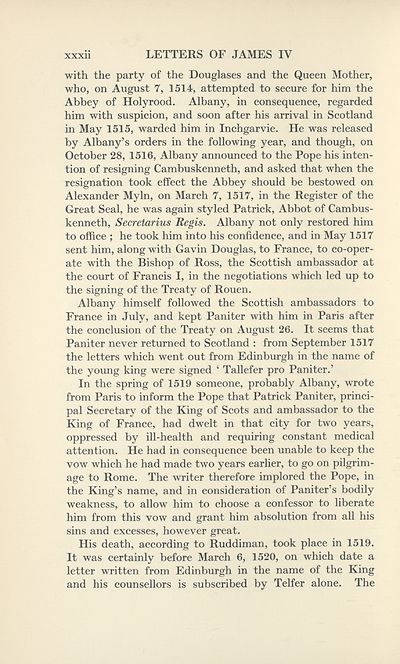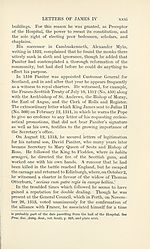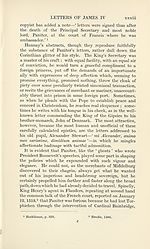Series 3 > Letters of James the Fourth, 1505-1513
(39) Page xxxii
Download files
Complete book:
Individual page:
Thumbnail gallery: Grid view | List view

XXX11
LETTERS OF JAMES IV
with the party of the Douglases and the Queen Mother,
who, on August 7, 1514, attempted to secure for him the
Abbey of Holy rood. Albany, in consequence, regarded
him with suspicion, and soon after his arrival in Scotland
in May 1515, warded him in Inchgarvie. He was released
by Albany’s orders in the following year, and though, on
October 28, 1516, Albany announced to the Pope his inten¬
tion of resigning Cambuskenneth, and asked that when the
resignation took effect the Abbey should be bestowed on
Alexander My In, on March 7, 1517, in the Register of the
Great Seal, he was again styled Patrick, Abbot of Cambus¬
kenneth, Secretarius Regis. Albany not only restored him
to office ; he took him into his confidence, and in May 1517
sent him, along with Gavin Douglas, to France, to co-oper¬
ate with the Bishop of Ross, the Scottish ambassador at
the court of Francis I, in the negotiations which led up to
the signing of the Treaty of Rouen.
Albany himself followed the Scottish ambassadors to
France in July, and kept Paniter with him in Paris after
the conclusion of the Treaty on August 26. It seems that
Paniter never returned to Scotland : from September 1517
the letters which went out from Edinburgh in the name of
the young king were signed ‘ Tallefer pro Paniter.’
In the spring of 1519 someone, probably Albany, wrote
from Paris to inform the Pope that Patrick Paniter, princi¬
pal Secretary of the King of Scots and ambassador to the
King of France, had dwelt in that city for two years,
oppressed by ill-health and requiring constant medical
attention. He had in consequence been unable to keep the
vow which he had made two years earlier, to go on pilgrim¬
age to Rome. The writer therefore implored the Pope, in
the King’s name, and in consideration of Paniter’s bodily
weakness, to allow him to choose a confessor to liberate
him from this vow and grant him absolution from all his
sins and excesses, however great.
His death, according to Ruddiman, took place in 1519.
It was certainly before March 6, 1520, on which date a
letter written from Edinburgh in the name of the King
and his counsellors is subscribed by Telfer alone. The
LETTERS OF JAMES IV
with the party of the Douglases and the Queen Mother,
who, on August 7, 1514, attempted to secure for him the
Abbey of Holy rood. Albany, in consequence, regarded
him with suspicion, and soon after his arrival in Scotland
in May 1515, warded him in Inchgarvie. He was released
by Albany’s orders in the following year, and though, on
October 28, 1516, Albany announced to the Pope his inten¬
tion of resigning Cambuskenneth, and asked that when the
resignation took effect the Abbey should be bestowed on
Alexander My In, on March 7, 1517, in the Register of the
Great Seal, he was again styled Patrick, Abbot of Cambus¬
kenneth, Secretarius Regis. Albany not only restored him
to office ; he took him into his confidence, and in May 1517
sent him, along with Gavin Douglas, to France, to co-oper¬
ate with the Bishop of Ross, the Scottish ambassador at
the court of Francis I, in the negotiations which led up to
the signing of the Treaty of Rouen.
Albany himself followed the Scottish ambassadors to
France in July, and kept Paniter with him in Paris after
the conclusion of the Treaty on August 26. It seems that
Paniter never returned to Scotland : from September 1517
the letters which went out from Edinburgh in the name of
the young king were signed ‘ Tallefer pro Paniter.’
In the spring of 1519 someone, probably Albany, wrote
from Paris to inform the Pope that Patrick Paniter, princi¬
pal Secretary of the King of Scots and ambassador to the
King of France, had dwelt in that city for two years,
oppressed by ill-health and requiring constant medical
attention. He had in consequence been unable to keep the
vow which he had made two years earlier, to go on pilgrim¬
age to Rome. The writer therefore implored the Pope, in
the King’s name, and in consideration of Paniter’s bodily
weakness, to allow him to choose a confessor to liberate
him from this vow and grant him absolution from all his
sins and excesses, however great.
His death, according to Ruddiman, took place in 1519.
It was certainly before March 6, 1520, on which date a
letter written from Edinburgh in the name of the King
and his counsellors is subscribed by Telfer alone. The
Set display mode to:
![]() Universal Viewer |
Universal Viewer | ![]() Mirador |
Large image | Transcription
Mirador |
Large image | Transcription
Images and transcriptions on this page, including medium image downloads, may be used under the Creative Commons Attribution 4.0 International Licence unless otherwise stated. ![]()
| Scottish History Society volumes > Series 3 > Letters of James the Fourth, 1505-1513 > (39) Page xxxii |
|---|
| Permanent URL | https://digital.nls.uk/126697059 |
|---|
| Attribution and copyright: |
|
|---|
| Description | Over 180 volumes, published by the Scottish History Society, containing original sources on Scotland's history and people. With a wide range of subjects, the books collectively cover all periods from the 12th to 20th centuries, and reflect changing trends in Scottish history. Sources are accompanied by scholarly interpretation, references and bibliographies. Volumes are usually published annually, and more digitised volumes will be added as they become available. |
|---|


